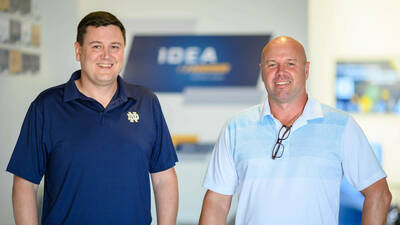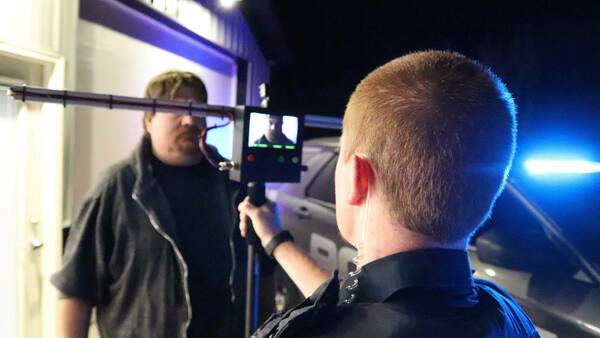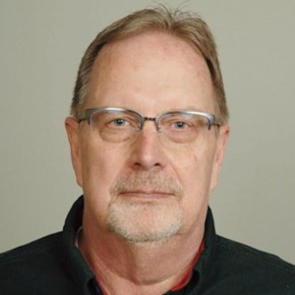
As a federal law enforcement officer with the National Park Service, Pete Zahrt was administering what’s known as the horizontal gaze nystagmus (HGN) test along a busy stretch of the Blue Ridge Parkway in Virginia, cars whizzing past at 60-plus mph, when it struck him: There has got to be a better way.
Part of the battery of assessments that comprise the standard field sobriety test, the HGN test measures nystagmus, or the jerking of the eyeballs, a relatively common response to visual stimuli that becomes more pronounced when a person is intoxicated.
To look for this, an officer will hold an object a specified distance from a suspect’s face and watch as the suspect, without moving, attempts to track the object back and forth along a horizontal plane according to a prescribed sequence of movements.
When properly administered, the test is relatively accurate and, when combined with the walk-and-turn and one-leg-stand tests, is generally admissible in court.
Still, it requires an officer’s full attention, presenting a risk when working along a busy road or highway, and is subject to the normal whims of human error and bias, conscious and unconscious.
With this in mind, Zahrt got to work inventing a device that could perform the test on its own, similar to the peripheral vision test one takes at an eye doctor’s office but for law enforcement.

Currently available as a prototype, the Nygt Rydr (pronounced “night rider”) is a portable device consisting of a rectangular display atop a narrow pole. It uses a camera and LED lights to perform the HGN test and returns a scientifically valid result nearly 100 percent of the time.
Now with interest from law enforcement, Zahrt, who lives about an hour south of Notre Dame in rural Winamac, Indiana, is working with the IDEA Center to build an actual business, which he’s calling Tippecanoe Technologies, around the device.
Having taken the idea as far as he could on his own, he’s excited to be working with the center moving forward, likening it to adding fuel to a flame.
“The power of that place — they put the pedal to the metal,” Zahrt, who grew up in Winamac before moving away for college, said of the IDEA Center. “It was just, overnight, a change, an acceleration of the business.”
‘They’re the hero’
Founded in 2017, the IDEA Center is an off-campus innovation hub dedicated to facilitating the movement of innovative ideas, including but not limited to student and faculty research, from discovery to commercial application.
And while the center is commonly viewed as the exclusive province of University of Notre Dame students, faculty and staff, it is increasingly recognized as a go-to resource for local entrepreneurs as well.
“The IDEA Center is a hub of entrepreneurship at the University,” said Ryan Kreager, the center’s assistant director of entrepreneurship. A Notre Dame graduate, Kreager previously worked as a software engineer. “We were really chartered and exist for the reason that we believe we can create prosperity by educating entrepreneurs and growing companies.”
“To meet people who are sharp as a tack and who are really innovative and know the ins and outs about software and marketing and the whole ballgame, it’s pretty nice to have that in my own backyard.”
From a suite of offices at Innovation Park, the center provides the necessary services, spaces and expertise for idea development, commercialization, business formation, prototyping and entrepreneurial education.
It also hosts an annual competition, the McCloskey New Venture Competition, that in addition to prize money provides participants with insight from mentors and judges, including a mix of angel investors, venture capitalists, successful entrepreneurs and other startup experts.
Still, the key ingredient is collaboration.
“One of things, oftentimes, that the University can be guilty of is coming in and saying, ‘We know how to solve that problem; let us save you,” Kreager said. “But entrepreneurs don’t want to hear that. They’re the hero of their own story.”
Instead, Kreager said, “We’ve been mandated to go out and say, ‘Hey, we’re from the University and we exist to serve you. Not to save you — to serve you.”
Chad Mastagh turned to the IDEA Center for help with his rideshare business.
A South Bend firefighter and former Uber driver, Mastagh is the founder and president of Rides2U, an app-based rideshare service specializing in late-night transportation and airport transfers primarily for college students. The company also works closely with colleges and high schools to help move students to and from internships and jobs.

In launching the business, Mastagh worked closely with the IDEA Center to build a leadership team and solicit money from outside investors.
Rides2U operates on a safety-first model. Drivers must submit to a background check and in-person interview. Vehicles are inspected annually for appearance, safety and reliability. Parents can reserve rides on behalf of their children. All rides are guaranteed.
Billed as a safer and more reliable alternative to traditional rideshare services, and with more generous benefits for drivers, Rides2U was named Best Community Venture and awarded $5,000 in prize money during last year’s McCloskey Competition, helping catapult it into a new stage of growth.
To date, the company, which operates in South Bend and Lafayette, Indiana, has secured more than $100,000 in funding through the IDEA Center and more than $300,000 overall, with plans to expand to Indianapolis, Bloomington and other primarily college town locations in the near future.
It recently launched its app.
“It’s been awesome,” Mastagh said of working with the IDEA Center. “I knew what I wanted to do and they made it happen.”
‘They do everything’
Like Mastagh, Dale Dorsey also participated in the McCloskey New Venture Competition, placing in the top five for Best Community Venture.
A former director of transportation with the Penn-Harris-Madison School Corp., Dorsey is the co-founder and COO of SafeRoutz, which develops and markets school bus routing software for K-12 school districts throughout the U.S.
SafeRoutz operates on a subscription model with no hidden fees or contracts, setting it apart from the vast majority of its competitors in the U.S. It updates its maps daily. It also provides live-chat customer support with experienced school transportation staff, a fresh idea in the industry. New customers can trial the software for 30 days with no commitment.

Dorsey, who lives in Granger, discovered the IDEA Center online and understood its value immediately.
“It kind of hit me between the eyes. I thought, ‘Man, they do everything they can to help startups,’” Dorsey said. “So I finally got the moxie to walk into the place and start talking to people, and they were really welcoming.”
The IDEA Center has since become an investor in SafeRoutz. It has also introduced Dorsey to other investors and to the wider network of entrepreneurs across the state.
“For me to have access to this is really a fantastic benefit,” Dorsey said of the IDEA Center and its network of resources. “To meet people who are sharp as a tack and who are really innovative and know the ins and outs about software and marketing and the whole ballgame, it’s pretty nice to have that in my own backyard.”
Zahrt agreed.
He’s currently working with the IDEA Center to raise about $3 million in funding to get Tippecanoe Technologies off the ground. The money will be used to secure a supply chain and begin manufacturing the Nygt Ryder at scale. He already has 10 police departments lined up to buy the device when it’s available.
“I call the IDEA Center my unfair advantage,” Zahrt said. “It has been such a tremendous asset.”
Determined to build on that advantage, the center is adapting a page from its own playbook.
As Kreager explains it, the center embraces market research as an important tool for understanding customers, and since “we believe in eating our own dog food, that means right now we’re engaging in a listening period.”
“We’ve got some ideas, we know some things we’re good at and we know some things we can get good at, we know the resources we have,” he said. “What we don’t know is how each person who’s the hero of their own story needs help from us.”
Originally published by at news.nd.edu on October 06, 2023.